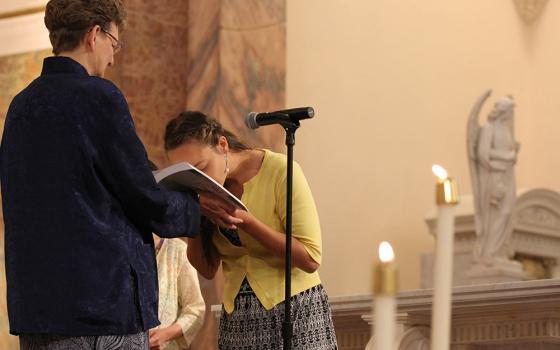On a recent trip for a friend's first vow ceremony, we sat around the night before in a mixed group of sisters and friends talking about the vows. I teased now-vowed Presentation Sr. Mary Therese "MT" Krueger with the question, "What's your favorite vow?" and it soon became obvious that some around the table were unclear what these mysterious vows were all about.
What did it actually mean to vow poverty, chastity and obedience? What happened if you "broke" a vow? Who were you vowing to? Thus a lively conversation ensued in an effort to impart a deeper understanding of religious life to MT's college friends, who had no idea what they were in for.
Some sisters attempted comparisons with the commitment of marriage; others argued that it was really quite different. Another sister mentioned that the way the vows were lived out was shaped in part by each community's charism. "So wait, what's a charism?" And on we went, down into the rabbit hole of Religious Life 101.
In the end, the diversion allowed MT to avoid disclosing her favorite vow, but the resulting discussion seemed to foster deeper awareness in the group about religious life and its meaning today. It also got me thinking about my own commitment and what a difference the vows have made in my life since I professed them for the first time this summer, surrounded by my sisters, family and friends.
One learning that continues to ring true for me is that the vows are not so much about saying "no" to something — no one committed partner, no individual freedom, no money – as they are about the resulting yes.
True, my vow of consecrated celibacy means I will not dedicate my love to one person exclusively. For me, this is a yes to a love without bounds, a broader sense of availability to those around me in my ministry and community.
Similarly my vow of obedience says "no" to the unbounded individualism one might experience outside of a committed relationship. More importantly, though, it is a yes to channeling my prophetic power to "bear public witness to God and the Reign of God," in the words of Immaculate Heart of Mary Sr. Sandra Schneiders.
So, too, with poverty: I do not see my paycheck. It goes into the common fund, and each person, each household, discerns and budgets what they need. But beyond funds, our Sisters of Providence Constitutions explain that in vowing poverty we commit to "detachment from material possessions and unreasonable adherence to personal opinions" and "ultimate dependence on God."
The yes of this vow has been a bit more difficult for me to grasp in a tangible way, but a few weeks ago, an experience with my local community shone a light on it for me. It was the Sunday before my brother's wedding, and I had been thinking for some time about getting my hair cut so I looked fresh for the occasion. I hesitated to spend the money, but more than that, I hadn't had the time or desire. Really all I wanted was a trim.
Sisters Connie, Carole and I were playing cards in the dining room that night when I had a thought. Glancing over my cards at Connie, I tested, "Would you ever consider cutting my hair?" Without blinking she said, "Sure. When do you wanna do it?" A few more sentences and it was decided — right after the card game, I would have my first "nun cut."
I was giddy as Connie got out her sharpest scissors and I brushed my hair. She grinned as she shared about her memories of her own mother cutting her hair when she was little. I shared about my mom cutting my bangs and my dad "buzzing" my brothers' hair with an electric razor. I could still see the swivel chair in the kitchen, a towel around Matt's neck as my dad proudly revved up his handy tool. I had heard Connie mention, too, how she holds dear the opportunities she has to wash her biological sister's hair since she has become less physically able over the past couple years.
Connie asked what I wanted, and I showed her with my fingers: "Just a trim — about that much." We quieted and I tried to stay still as she began snipping. I smiled as I thought about our current situation — two nuns in our PJs cutting hair in the convent bathroom — and saw my hair falling to the floor.
As I waited, watched and listened, I thought about how perfect Connie's gifts were for this task. She is a master of detail and precision, and she has the patience for it. Once she thought she was finished, she called in Carole — more of a big-picture person — to look at the finished product and add her thoughts. She pointed out a couple of uneven spots in need of attention and then nodded her approval. Connie held a mirror up behind me so I could see, but it was a tough angle — I really couldn't tell if it was even. But I was content and trusted that the two of them had it figured out.
As I happily brushed out my now lighter head of hair, I was overtaken by a glow of gratitude for this "nun cut." In saying no to a store-bought cut, I had found a priceless yes.
The vulnerability of letting go and entrusting my locks to another sister's care created spontaneous space for bonding over dear memories and sharing focused, sacred moments.
Each one offered her gifts open-handedly, without cost. My sisters' unconditional care and attention gave me a simple yet profound sense of how beloved I was by a Creator who counts every hair on my head. "Wow," I thought, "if I had stopped at a strip mall, I would have spent $15 and said no to all of this." Out of this expression of poverty was born a simple and beautiful yes.
This National Vocation Awareness week, as I reflect on three years of life as part of the Sisters of Providence community and the last four months living the vows, I run my fingers through my hair and praise my Source for the immeasurable and unpredictable gifts of my yes.
[Tracey Horan is a member of the Sisters of Providence of Saint Mary-of-the-Woods, Indiana. Her first deep conversation with this community occurred in a melon patch during her time as an intern at the Sisters' White Violet Center for Eco-Justice. She is a community organizer with Indianapolis Congregation Action Network (IndyCAN).]



